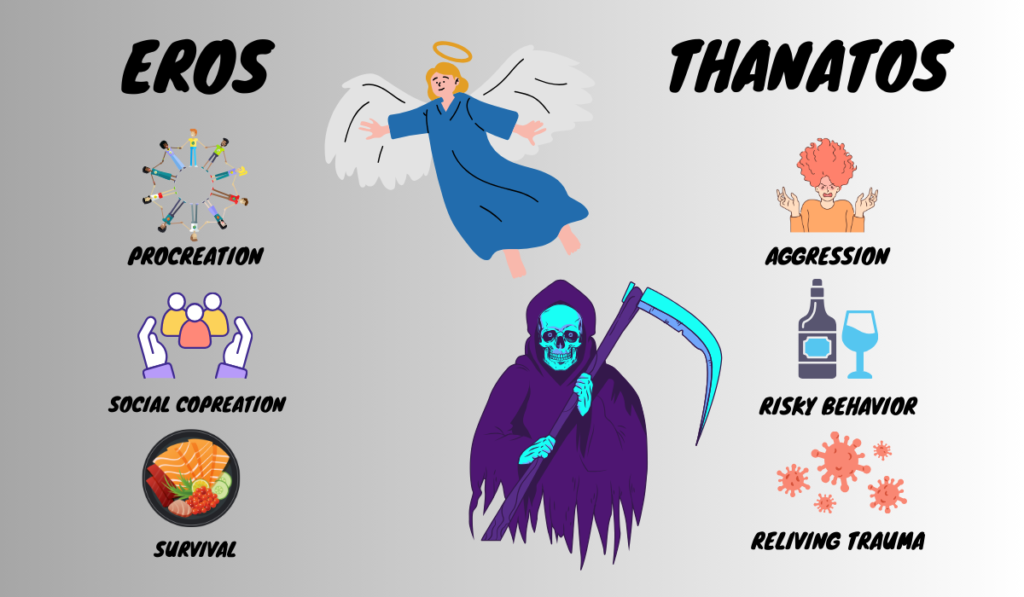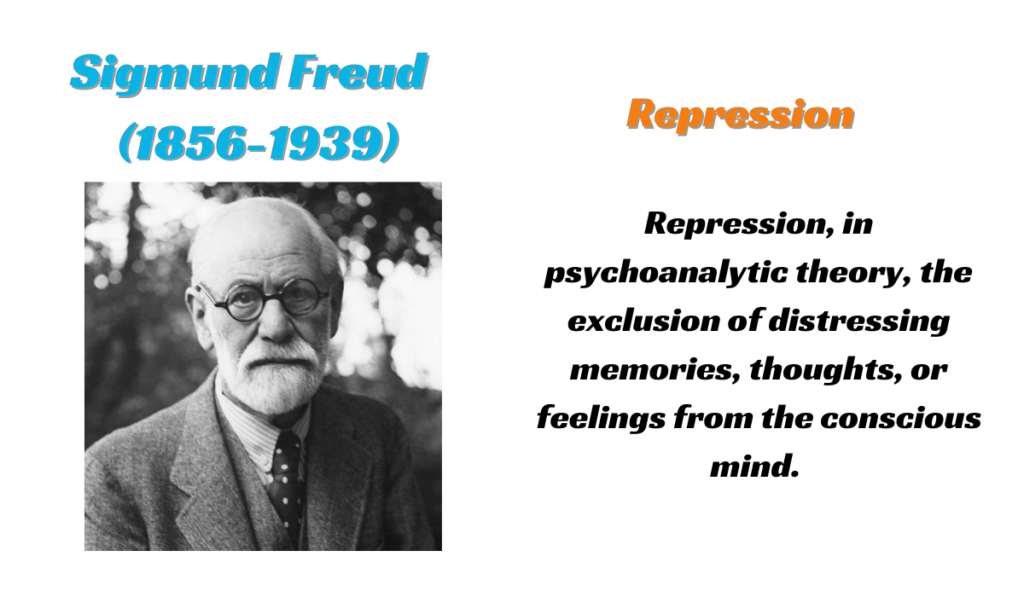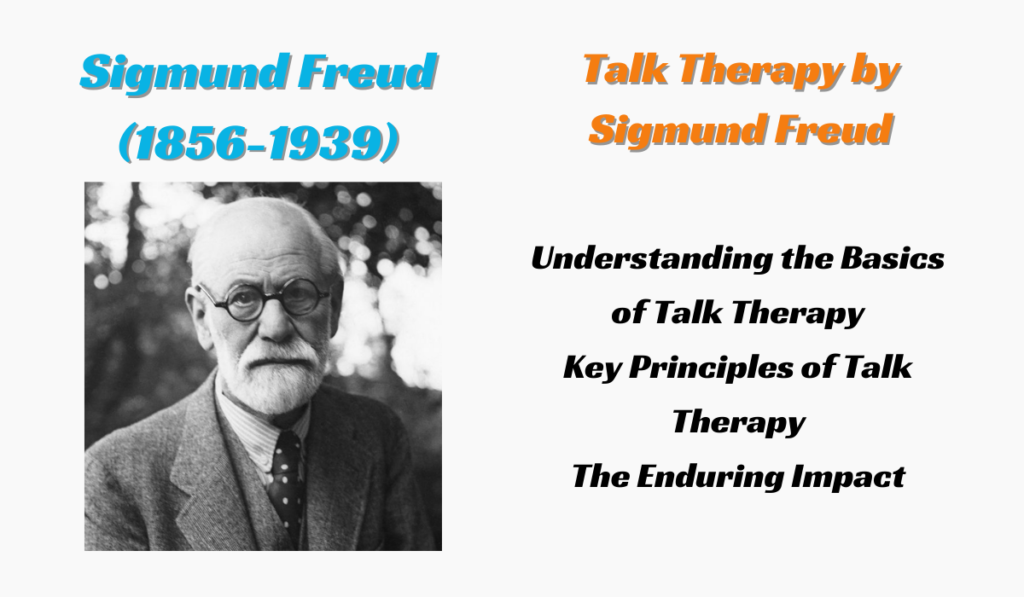
Key Takeaways
- Eros and Thanatos are two opposing forces—constantly influence our thoughts, emotions, and behaviors.
- Eros is Freud’s concept of the life instinct, responsible for love, survival, pleasure, and creativity.
- Thanatos represents the death instinct, linked to aggression, self-destruction, and the desire for peace through non-existence.
- Freud introduced the death instinct to explain repetitive, harmful, or risky behavior that goes beyond the need for pleasure or survival.
- The balance between life and death instincts plays a key role in the psychoanalytic model by Sigmund Freud.
- Our ego works to manage the tension between Eros and Thanatos to maintain emotional and mental balance.
- These instincts also interact with concepts like cathexis (emotional energy investment) and anticathexis (emotional energy used to block harmful urges).
Sigmund Freud explain that there are various factors that play a crucial role in shaping an individual’s personality, for instance, including Eros and Thanatos also known as life and death instincts, and Cathexis and Anticathexis. These concepts offer a unique perspective on human behavior and the driving forces behind it.
Eros and Thanatos: Life and Death Instincts
According to his theory, Life instincts also known as Eros, and Death instincts known as Thanatos.
Life Instincts: Eros
Definition and Origin
Life instincts, which is also known as Eros, are fundamental forces that promote life, growth, and pleasure. They are innate and originate from within the individual.
Purpose
Eros aims to ensure the survival and well-being of the individual and the species by seeking pleasure and reducing discomfort.
Examples
- Love, sexuality, and the pursuit of happiness.
- Nurturing and caring for loved ones.
- Creative endeavors, such as art and self-expression.
Function
Life instincts encourage bonding, procreation, and the development of positive emotions, leading to the preservation of life.
Death Instincts: Thanatos
Definition and Origin
Death instincts is also known as Thanatos, represent an innate urge towards self-destruction and the cessation of life. Freud believed these instincts emerged from deep within the unconscious.
Purpose
Thanatos seeks to return the individual to a state of non-existence, relieving them of pain, stress, and life’s challenges.
Examples
- Risk-taking behaviors that endanger one’s life.
- Self-destructive habits, such as substance abuse or reckless driving.
- Suicidal thoughts and actions.
Function
While counterintuitive, Thanatos can be seen as a coping mechanism that helps individuals escape unbearable emotional or physical suffering.
Conflict and Balance
Inner Struggle
While explaining the Life Instincts and Death Instincts, Freud proposed that these opposing forces, Eros and Thanatos, exist within every individual, leading to a constant internal struggle.
Importance of Balance
Achieving a balance between Life Instincts and Death Instincts is essential for psychological well-being. Excessive dominance of one can lead to various psychological issues.
Role in Psychoanalysis
Freud’s theories, including the concepts of Eros and Thanatos, laid the foundation for psychoanalysis and understanding the subconscious mind.
Application in Modern Psychology
Trauma and Coping
Freud’s ideas on Life Instincts and Death Instincts are still relevant today in understanding how individuals cope with trauma and adversity.
Self-Destructive Behavior
Modern therapists often consider the role of Thanatos when working with individuals exhibiting self-destructive tendencies.
Conclusion
Freud’s concept of Life Instincts (Eros) and Death Instincts (Thanatos) sheds light on the complex and often contradictory nature of human behavior. These ideas continue to influence modern psychology, offering valuable insights into our inner struggles and the pursuit of balance and well-being in our lives. Understanding these instincts can help individuals and therapists navigate the complexities of the human psyche.
Bibliography
Johnson B, Flores Mosri D. The neuropsychoanalytic approach: Using neuroscience as the basic science of psychoanalysis. Front Psychol. 2016;7:1459.doi:10.3389/fpsyg.2016.01459
FAQs
1. What is the meaning of Eros in Freud’s theory?
Eros represents the life instinct in Freud’s psychoanalytic theory. It includes the drive for survival, love, pleasure, creativity, and reproduction. It motivates positive behaviors like bonding, care, and building relationships.
2. What does Thanatos mean in psychology?
Thanatos is the death instinct, a concept Freud introduced to explain the human drive toward aggression, self-destruction, risk-taking, and even the desire for a peaceful end. It often operates silently and can influence harmful behaviors.
3. How do Eros and Thanatos work together?
Eros and Thanatos exist together in the mind, often in conflict. While Eros pushes us to grow, create, and connect, Thanatos pulls toward destruction, aggression, or returning to a state of non-existence. The ego manages this balance to keep behavior in check.
4. Why did Freud introduce the death instinct?
Freud introduced the death instinct (Thanatos) after observing repetitive, harmful behaviors in people, including war trauma victims. He believed that not all human actions are driven by pleasure or survival, but sometimes by an unconscious wish to end suffering.
5. How do life and death instincts affect personality?
According to Freud’s psychoanalytic model of personality development, life and death instincts influence how energy (libido) is used in the mind. Eros drives emotional attachments (cathexis), while Thanatos triggers internal conflicts and may require mental defenses (anticathexis) to control destructive urges.
Mariam holds an MS in Sociology with a specialization in Medical Sociology and Social Psychology. With a strong academic background and extensive research work in both fields, she brings depth and clarity to complex topics. Her writing explores the intersection of society, health, and the human mind, making academic ideas easy to grasp and relevant to everyday life.



Pingback: Let’s find out some Famous Psychologists and their Theories - KnownPsychology
Pingback: Freud's concept of Cathexis and Anticathexis